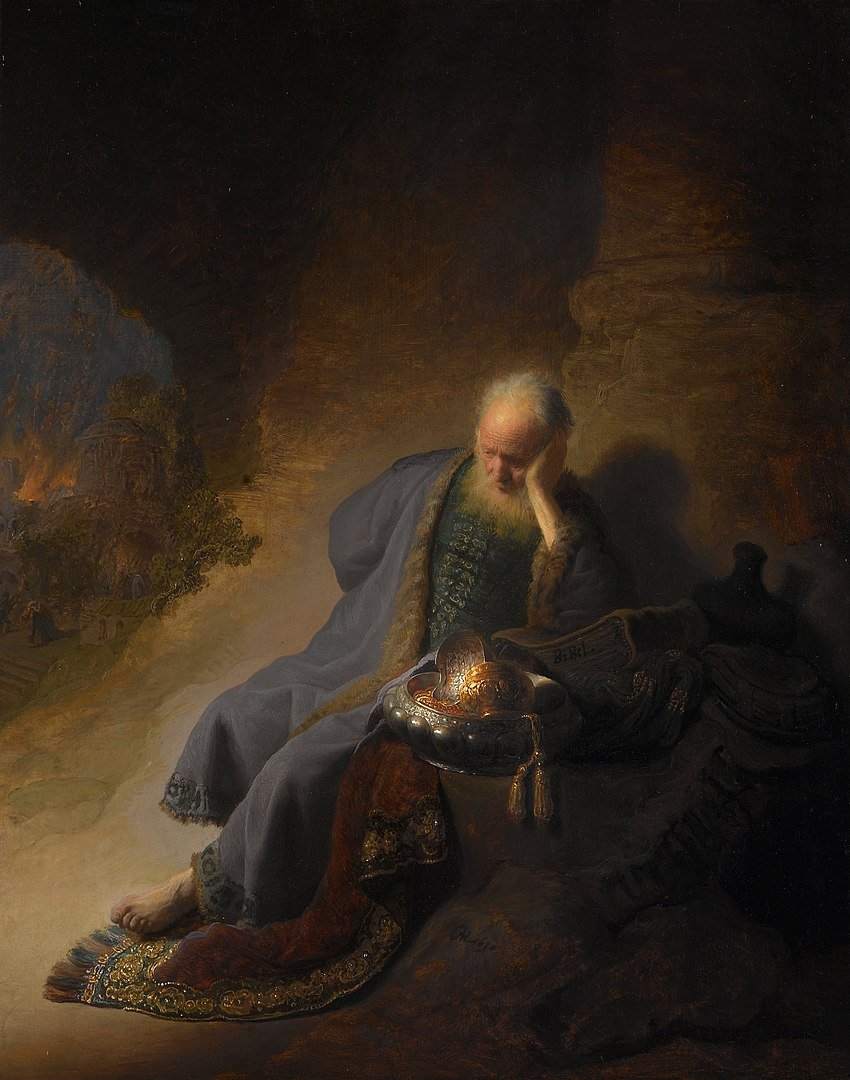Longing for the Wholly Other
Warfare and Strife
We live in a time of brutal warfare abroad and unrelenting strife at home. Russia’s attack on Ukraine, now well into its second year, seems interminable. The recent escalation of armed conflict in Israel and Palestine, with its massive destruction of human life and habitations, seems to have only just begun. Moreover, in North America these battles abroad receive constant amplification through countless attacks and counterattacks among fervent spokespersons and their opponents.
Jeremiah Lamenting the Destruction of Jerusalem. Oil painting (1630) by Rembrandt, public domain, via Wikimedia Commons
No party is entirely blameless in these conflicts. Yet all want to have God (or the USA or world opinion) on their side. I’m reminded of Jeremiah’s lament during the disintegration of ancient Israel. In a founding text for Judaism, Christianity, and Islam, the prophet writes:
From the least to the greatest of them,
Everyone is greedy for unjust gain;
And from prophet to priest,
Everyone deals falsely.
They have treated the wound of my people carelessly,
Saying “peace, peace,” when there is no peace.
(Jeremiah 6:13-14, NRSV)
Yet this lament makes sense only because the book of Jeremiah holds out hope for peace. So too, the despair so many of us feel over unending warfare and strife makes sense only if we can envision and work toward a different world. For Jeremiah, peace could prevail if everyone, especially society’s leaders, would pursue justice and truth. And for us? What do we envision?
Peace as Shalom
Shalom/Salaam/Peace. Public domain, via Wikimedia Commons
To begin, we need to ask what we long for. Many people in strife-torn countries long for peace. But peace is not simply the cessation of conflict. It is the full restoration of damaged lives and communities. “Shalom,” the Hebrew word Jeremiah uses, like “salaam” in Arabic, has much richer connotations than the English word “peace.” Shalom means the renewal of right relations across all of creation. It’s what I try to capture in the phrase “interconnected flourishing.” To long for peace, then, is to want all earthlings to flourish, including our supposed enemies and not only our friends. And to pursue peace is to live up to the expectations for justice, solidarity, and stewardship discussed in my blog post Critical Hope. Without justice, as Jeremiah understood, there is no peace.
I realize, of course, that not all of my readers consider Jeremiah an authority on peace. Indeed, not all of us practice a traditional religion such as Judaism, Christianity, or Islam. We include atheists, agnostics, and spiritual seekers for whom traditional religion is unappealing or hurtful. By quoting from Jeremiah, I do not intend to exclude anyone. I simply aim to share as openly as possible the deepest sources to my own critical hope for a better world. That’s part of what it means to do philosophy with a human heart.
There are many aspects to traditional religion that I find damaging, distasteful, or downright destructive. Further, the ways traditional religions fuel and justify current conflicts are acutely disturbing. Yet I refuse to surrender the central spirit of traditional religions, namely, this: Earth and its inhabitants are created by divine love; living within and toward such love is our highest calling. The way to do this, in my own language, is to be faithful to societal principles such as justice and solidarity for the sake of interconnected flourishing. In other words, all humans are divinely called to be peacemakers in a robust sense: to be co-creators of shalom.
No Utopia
Low-angle photo of building’s roof, Kyiv. Photo by Serhii Tyaglovsky on Unsplash
Now, if the religiosity of such language does not put you off, perhaps its seemingly utopian quality does. It’s hard enough to imagine a world where Israelis and Palestinians can live peaceably, in justice and solidarity, and side by side. What can it possibly mean to envision a world where all creatures interconnectedly flourish? Isn’t that simply an empty utopia, a no place (ou topos), as the Greek root to “utopia” literally means?
No, it’s not. To the extent that current social practices and institutions align with societal principles, it is historically possible to pursue full-fledged justice and solidarity and stewardship. To the extent that we can imagine a better world, new paths to flourishing can be found. To the extent that a spirit of goodness remains active in society, a spirit of divine love that surpasses human achievements, surprises of renewal await us. All the great songwriters have understood this, from Elaine Hagenberg (“O Love”) to Leonard Bernstein (“Somewhere,” from West Side Story) to the many settings of “Dona nobis pacem” (“Give us peace”) in the choral literature.
Theodor Adorno, who wrote in the shadow of Auschwitz, knew why it’s crucial never to give up social hope. He was an unrelenting critic of modern Western society, as I show in my essay on Adorno for the Times Literary Supplement. He understood all too well the connections between exploitation and appropriation discussed in my Good Work and New Earth posts. Many have considered him unduly pessimistic. Yet, as I show in Adorno, Heidegger, and the Politics of Truth (SUNY Press, forthcoming), Adorno’s unrelenting social critique embodies a radically critical social hope, a hope for what his book Negative Dialectics calls “the humanly promised other of history.” Although the promise of a completely transformed society is currently blocked, Adorno claims, that doesn’t mean substantial social transformation is impossible. As his close colleague Max Horkheimer said in a 1970 interview, one year after Adorno died, we can still hope “that the injustice that marks the world would not prevail.” We can still long for a world where “the murderer would not triumph over the innocent victim.”
Dona Nobis Pacem
Horkheimer’s remarkable interview is called Die Sehnsucht nach dem ganz Anderen (Longing for the Wholly Other). That’s also the title for a recent sculpture by Joyce Recker, my wife. I love this sculpture; an image of it appears on the front cover of my new book about Adorno. Joyce’s sculpture stands about two feet tall. It’s a house-like structure made from wood, plexiglass, and copper wire. A fragile bird’s nest hovers within, midway between egg-like white rocks below and the photo-transferred image of a white dove in flight above.
In an artist’s statement, Joyce writes about her “Longing for the Wholly Other” as follows: “A tension runs throughout between a sense of ‘home’ and a world we have made fragile, broken, and restless: a world where we erect boundaries to create a false sense of safety; a world where, in the wake of human violence and greed, eggs turn to stone; a world churning with environmental upheaval; a world where the dove of peace will never land. And yet a world where, against all odds, this house can become a home.”
When we seek peace, we long for the wholly other. We want Earth to become a home for all. And, as in the soaring and solemn contrapuntal “Dona nobis pacem” that concludes Johan Sebastian Bach’s Mass in B Minor, we address our grace-noted cries not only to ourselves but also to a spirit of goodness that exceeds us all: Give us peace.




